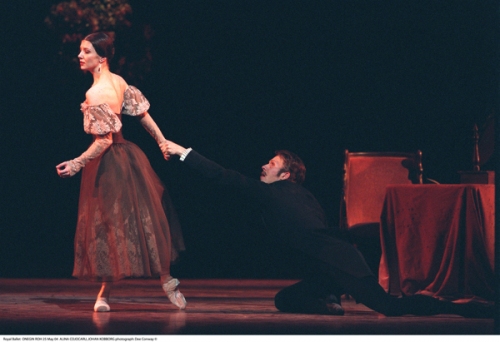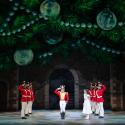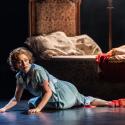One gin is not enough, not two, or even three gins, to make me susceptible to the idea that John Cranko’s ballet Onegin is anything more than a second-league costume drama with a peachy ballerina role in the middle. But it’s box office, and with Alina Cojocaru and Johan Kobborg in the central roles last night for the Royal Ballet's opening salvo of the season, there wasn’t a hair's-breadth spare in the house, every place gone, even the standing ones in the gods where you can only see a sliver of the stage.
Lucky audience to see this stellar pair of dance-actors attempting with all their matchless skills to infuse blood into the pallid veins of what’s largely a delineation of Pushkin's plot, rather than an exploration of emotional situations. In 1965, somewhere near the great bluff marked Ashton, two streams diverged in big-budget ballet storytelling - Kenneth MacMillan setting out on an inner path, telling Romeo and Juliet’s story via subjective empathy and cinematic freshness, and John Cranko taking the linear 19th-century route, providing a full-colour role for a dramatic ballerina in Tatiana and surrounding her with cardboard men in wigs and moustaches and docile damsels dancing polonaises.
Possibly seeing Onegin so soon after the Bolshoi Opera’s great staging of the vastly greater opera spoiled it for me. Neither the music nor dramatic psychology in the ballet even approaches the opera's. I grant that in places, where Tatiana is, Cranko comes up with his most expressive choreographic scenes. Her initial bookish encounter with Onegin in Act One, alternating shy duetting with his bold, self-advertising solo, clarifies in a few minutes a change in each: she is suddenly in love with him, while he, having felt the urge to display himself to her, shuts up like a clam on realising that this girl is dull little Jane Eyre, not gorgeous Blanche Ingram. It is an acute psychological vignette, but it comes at the beginning of the ballet, and there is nothing as good and fresh as it throughout the rest, not even the final emotive but predictable scene.
For the rest, much is by numbers, particularly for the two male parts, Onegin and his friend Lensky, the fiancé of Tatiana’s merry sister Olga. Lensky's chief purpose is to become jealous of Olga's flirting, challenge Onegin to a duel, dance a big audience-pleasing solo like any respectable tenor facing death in a 19th-century opera should, and die. Onegin’s role requires sternly groomed facial hair and some reluctant partnering to begin with, a brief change into Tatiana’s dream lover in her “letter” scene - a sweet but demure echo of the much more interesting MacMillan "Balcony Scene" in Romeo and Juliet - some acting heroics over the fatal duel, and thenceforth clutching his head in agonies of guilt to the bitter end.
Like Romeo, Onegin kills someone he ought not to have, and it causes his banishment. Like Romeo, he returns too late to achieve his love, except that in this ballet it is his fault for being high and mighty. Kobborg is remarkably good at being high and mighty, while showing in his body and still vibrant dancing a genuinely urgent yearning. Nothing Kobborg does can be less than fascinating, technically, but the only characterising I have seen of the balletic Onegin that I found persuasive over the years was Thiago Soares’s nervous playing of him as a young man trying to act older, not as a mature man acting like a child, which is what Kobborg gave last night.

Cojocaru was bewitching as Tatiana, drab as a wren to start with, the little spinster sister wishing on a star. My criticism (as too often where ballet companies forget they are theatre companies) is that the cast lacked the firm dramatic direction to work as an ensemble whose passions heatedly entwine, the only way this ballet can hope to come off. If a family is used to ignoring a sister played by Cojocaru, let the other sister be someone more eyecatching than the very young Akane Takada, a delightfully graceful young Bolshoi-polished Japanese of 19, but with as yet quite a bit to learn about delineating a personality. And if the vigorous Steven McRae is to be cast as the fiery loser Lensky, let someone teach him to tone down his macho so that we believe Lensky wouldn’t just pulverise Kobborg’s Onegin into a mess of bloody bruises rather than allow him to steal his girl.
The score is part of the trouble, an arrangement by Kurt-Heinz Stolze that lards Tchaikovsky’s mooning, private piano Seasons into fat, instrument-stuffed public scenes (just as unfortunately as the almost contemporaneous Liszt reorchestration for Ashton’s Marguerite and Armand). It only bursts into painful and tragic flower in the closing scene (pictured above, Cojocaru and Kobborg, by Dee Conway) set to the Francesca da Rimini music, real orchestral Tchaikovsky, where at last Cranko lets go of 19th-century politesse and makes his two protagonists dance out something rougher and messier about their ill-timed feelings. At last, but too late to be great.
Below, Venezuela’s school-age Teresa Carreño Youth Symphony Orchestra (Gustav Dudamel’s alma mater) play the section of Tchaikovsky’s Francesca da Rimini that closes the ballet:
- The Royal Ballet performs Onegin at the Royal Opera House on dates until 25 October. Among casts to look out for, Laura Morera's Tatiana, Federico Bonelli's debut as Onegin, Thiago Soares's Onegin, Sergei Polunin's Lensky, Melissa Hamilton's debut as Olga
- See what's on at the Royal Ballet in 2010-11
- Read more Royal Ballet reviews
- The Teresa Carreño Youth Symphony Orchestra plays the fifth symphonies of Beethoven and Prokofiev at the Royal Festival Hall, 12 October. Read David Nice's review














Add comment